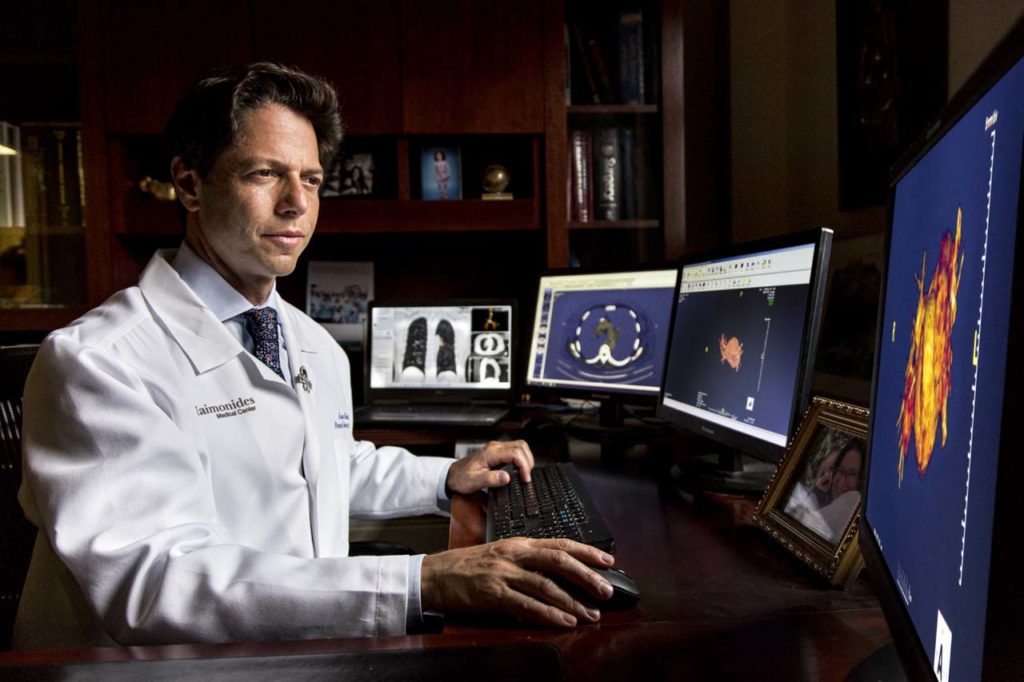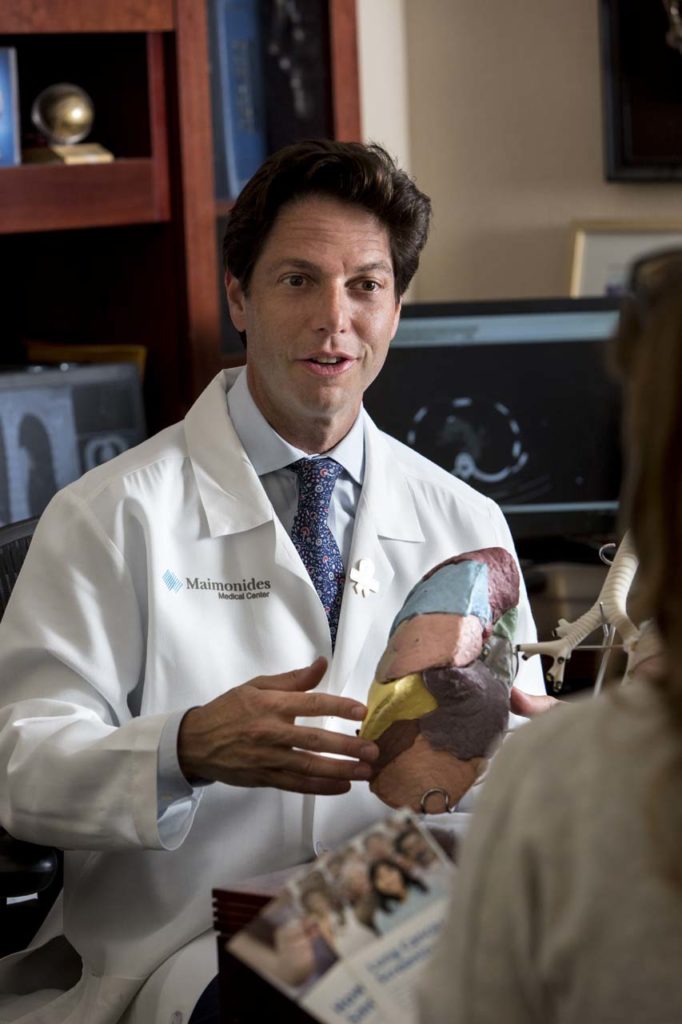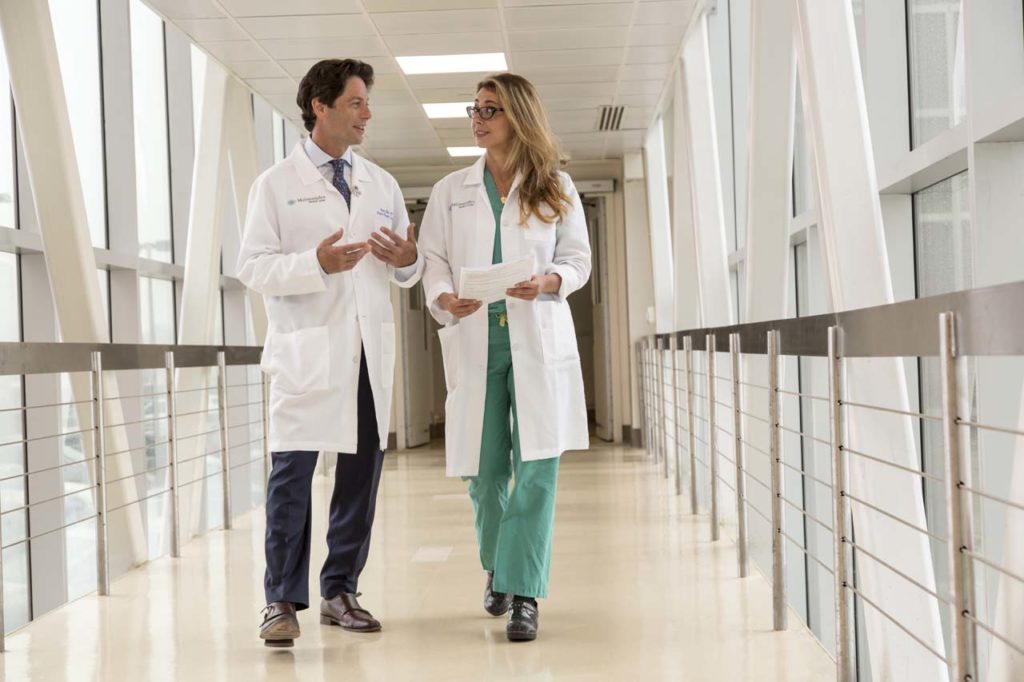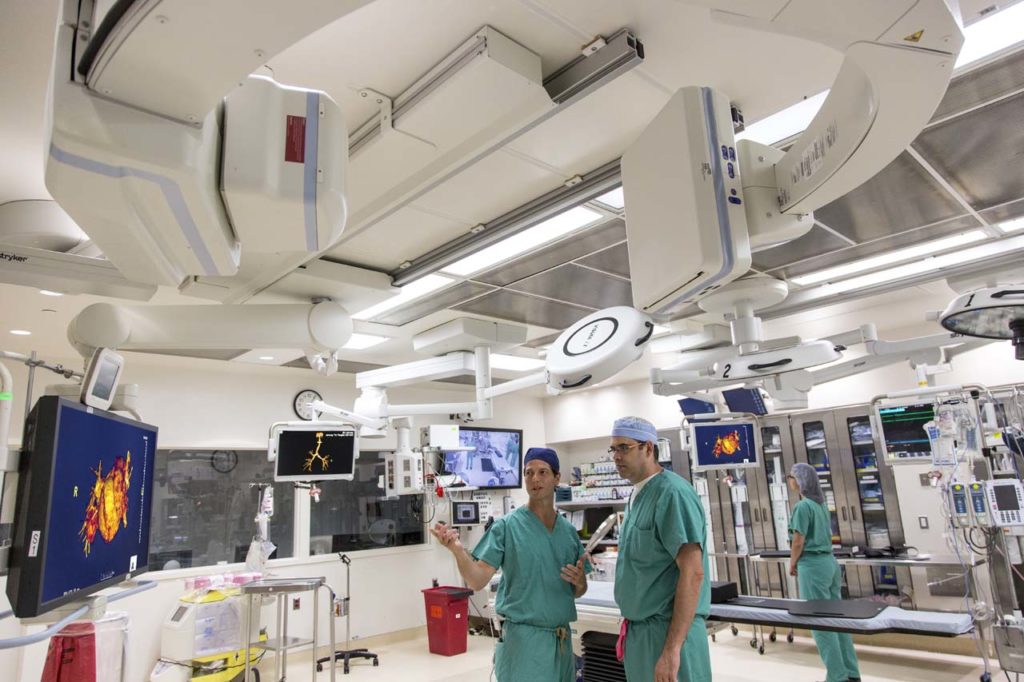MAIMONIDES MEDICAL CENTER’S LUNG CANCER PROGRAM OFFERS NEW TECH FUELED TREATMENTS TO PATIENTS WITH CANCERS AND OTHER DISEASES OF THE CHEST
BY JESSICA JONES GORMAN • PHOTOS © AMESSÉ PHOTOGRAPHY
When Maimonides Medical Center introduced its Lung Cancer Screening Program in 2013, offering low dose CT scans to high risk patients before any symptoms had even presented, the goal was to improve Brooklyn’s cancer mortality rate, identify lung cancer at an early stage, and allow for a comprehensive treatment plan that would most likely result in a cure. Now, just six years in, its efforts have proven remarkably successful.

“We’ve seen a huge impact here in Brooklyn,” noted Dr. Jason Shaw, Division Chief of General Thoracic Surgery at Maimonides and Director of the Lung Cancer Screening Program. “There have been 33 cancers detected since the program’s inception, and over half of those were caught at an early stage, making them much more easily treatable and more likely to be curable.”
A first of its kind in Brooklyn, the Program has been ranked by the American College of Radiology as among the top in the country for detecting suspicious nodules. It offers X rays, computed tomography (CT) scans, positron emission tomography (PET) scans, auto fluorescence bronchoscopies, narrow band imaging bronchoscopies, endobronchial ultrasounds, upper endoscopies, and transthoracic CT guided needle biopsies.
“This program is something I believe in and am passionate about,” Dr. Shaw said. “Our chest radiologists are extremely good at what they do. We’ve seen over 1,000 patients since 2013 and issued more than 2,600 low dose CAT scans. Their ability to identify and make accurate diagnoses is simply second to none.”

Maimonides also offers preventive services for other thoracic cancers: For esophageal cancer, its physicians specialize in endoscopic mucosal resection and minimally invasive esophagectomy. And the Nissen Center for the Treatment of Heartburn & Esophageal Disease offers minimally invasive surgical techniques to treat chronic acid reflux.
Those who qualify for lung cancer screenings include individuals 55 years or older with a smoking history of at least 30 “pack years” (packs per day multiplied by the number of years one has smoked). Those who are currently smoking or have quit within the last 15 years and feel healthy also qualify. But the thoracic oncology program goes beyond lung screenings—bringing cutting edge multidisciplinary care to patients with cancers of the chest, including malignant mesothelioma, metastatic cancers, and mediastinal tumors such as thymoma, germ cell tumors, and lymphoma. Doctors in this division are committed to giving patients the best chance for a cure while preserving their quality of life.
“Our chest and lung cancer doctors are trained in minimally invasive techniques for biopsies and surgeries,” Dr. Shaw said. “Procedures are done with techniques able to find cancers not visible to the naked eye. Our doctors also use ultrasound that can help diagnose or determine its stage with a few small surgical incisions.”

Prior to joining the Maimonides team, Dr. Shaw had five years of general surgery training at North Shore University Hospital, two years of research at New York University, a thoracic surgery fellowship at University of Miami Hospital, and an additional year of minimally invasive thoracic surgery training at Mount Sinai Hospital. “I focused on this specialty for several reasons,” he explained.
“I find the physiology of the heart and lungs fascinating, and during the time of my training, the late 1990s and early 2000s, minimally invasive surgery of the chest was just beginning to grow. Thoracoscopic surgery was taking off; it was an exciting time.” When a colleague and friend was diagnosed with lung cancer, Dr. Shaw made the decision to home in on thoracic oncology. “We did our surgical residencies together,” he said.
“He had never smoked a day in his life but had to battle this disease. Sadly he passed, but his struggle left me hopeful and committed to ensuring that other patients with lung cancer and other diseases of the chest could have better outcomes. I wanted to be part of future research, taking advances in surgical technique to another level.”
Dr. Shaw has also spent a good portion of his career conducting research in the field of angiogenesis—including developing a mouse model to examine how blood vessels form in tumors in order to understand how their growth may be prevented. He has authored textbook chapters, published several peer reviewed papers, and spoken at national conferences. At Maimonides, he is focused on the diagnosis and management of a range of chest cancers and disorders.
“Our esophageal program includes advanced endoscopic therapies and we have a wonderful program for the mesothelioma patients of Brooklyn who have been exposed to asbestos,” he said. “Our division also has a pectus program for chest wall disorders that often affect adolescents.” The quality of outcomes in thoracic surgery generally, Dr. Shaw explained, has changed significantly, in part because of technological advances.

“Here at Maimonides, over the past four years, according to the database of the Society of Thoracic Surgeons, we have been a positive outlier compared to other participating hospitals in terms of mortality rates and the use of minimally invasive lung lobectomy,” he explained. “Our rate of performing a minimally invasive lobectomy versus an open surgery is over 90 percent, which is also above the national averages.”
“In fact, the majority of our surgeries are minimally invasive,” he added. “We utilize video assisted thoracoscopic surgery (VATS) or robotic assisted surgery quite often, and those result in quicker recoveries and better outcomes. We also try to preserve as much of the lung as possible in each procedure, and that idea of preservation allows us to operate on an older population. We’re offering potentially life saving treatment to people who in the past were too high risk.”
The hospital is also focused on providing a multi disciplinary approach to its thoracic patients. “Such an approach has really taken over cancer care. Tumor boards and other collaborative efforts are significantly advancing the quality of treatment,” Dr. Shaw said, adding that a plan of action is put into place as soon as a patient receives a diagnosis.
“A cancer diagnosis provokes anxiety, of course, so we like to expedite treatment,” he said. “Our team immediately goes to work scheduling all necessary tests and appointments, getting the patient into our system in a rapid fashion.” Asked to name an additional treatment breakthrough, he took little time for his answer. “Immunotherapy is an incredible development in terms of treating lung and esophageal cancer as well as in the potential treatment of other chest tumors,” he said. “I think in the near future, it will be used before surgery to shrink tumors, and is a sector of medicine that is making a lot of other promising strides.” Additionally, diagnostic tools like navigational bronchoscopy and liquid biopsies are helping with the early detection of tumors and Dr. Shaw feels those concepts will only develop further.
“I think these advanced bronchoscopic and endoscopic techniques will open up entirely new ways for both the diagnosis and treatment of small lung cancers or esophageal tumors that are superficial and confined to the mucosa,” he said. “I also think more advancements will be made in nuclear medicine, allowing for pinpoint radiation and ablative treatments that can destroy a tumor without surgery.”
And it’s all happening right here in Brooklyn. “Maimonides is an academic center, so we are teaching residents and participating in research while at the same time embracing the community hospital philosophy,” Dr. Shaw concluded. “We are treating borough residents right here where they live. You do not have to travel far to receive fantastic care.”
Maimonides Medical Center
4802 Tenth Avenue / 888 MMC DOCS /
maimonidesmed.org
